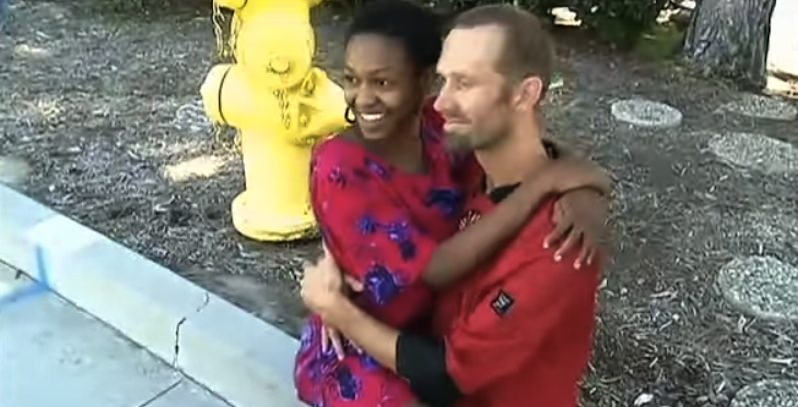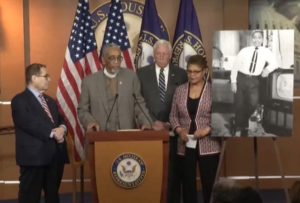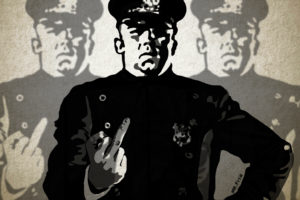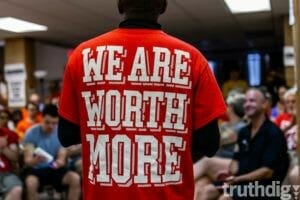In Defense of Daniele Watts
When people of color, especially black Americans, are constantly treated with suspicion by both society and law enforcement, they are expected to just take it silently and "file that complaint later." Daniele Watts and her boyfriend, Brian James Lucas, tell a Fox 11 Los Angeles reporter about their run-in with the LAPD. Fox 11 Los Angeles screen shot
Daniele Watts and her boyfriend, Brian James Lucas, tell a Fox 11 Los Angeles reporter about their run-in with the LAPD. Fox 11 Los Angeles screen shot
In a recent Op-Ed in the Los Angeles Times, actress Daniele Watts told her story of a controversial encounter she had with a Los Angeles Police Department officer. It was an incident that garnered much media attention, most of it negative. Although the African-American actress, best known for her role as Coco in “Django Unchained,” was eloquent in defending her actions, I believe it is important for feminists and those who believe in racial justice to also speak out, for Watts’ story and the harsh public response to it are representative of what black women in the U.S. experience far too often.
On Sept. 11, 2014, apparently responding to a call over so-called lewd acts in public, an officer asked to see Watts’ ID while she was with her boyfriend, standing on a sidewalk in Studio City. Watts felt that the officer was unfairly singling her out because of her race and because she was showing affection publicly to her boyfriend, who is white. After refusing to turn over her ID, she was eventually handcuffed. Photos of her weeping next to the officer went viral.
Eventually, after being released, Watts posted her reaction to her Facebook page:
As I was sitting in the back of the police car, I remembered the countless times my father came home frustrated or humiliated by the cops when he had done nothing wrong. I felt his shame, his anger, and my own feelings of frustration for existing in a world where I have allowed myself to believe that ‘authority figures’ could control my BEING.
Very soon Watts found herself at the center of a firestorm of criticism. The audio recording of her interaction with the police officer was made public. TMZ, which accused her of pulling “the race, fame card,” managed to find photos of her with her boyfriend in their car just before the arrest, being physically affectionate (Watts was sitting on his lap, but both were fully clothed). The rabidly right-wing radio talk show “John and Ken” interviewed the police officer on the scene, Sgt. Jim Parker. The show’s hosts accused Watts of displaying “hysterics” and of crying “fake tears.”
Although she was initially supported by Los Angeles figures Earl Ofari Hutchinson and Najee Ali, after seeing the TMZ photos the self-professed civil rights activists retracted their support, and held a news conference demanding Watts apologize to the LAPD (Watts confirmed to me that Hutchinson and Ali did not at any time reach out to her personally over what the photos purportedly showed). Their claim that Watts “cried wolf” seems to have been almost as widely reported as the original incident and provided fodder for right-wing blogs like Breitbart.com to further slam Watts.
Many in the so-called liberal media also failed Watts. Websites like Think Progress avoided the topic altogether, while in the mainstream media, CNN host Michaela Pereira practically wagged her finger at the actress to try to get her to express regret for not showing ID. CNN legal analyst and defense attorney Mark O’Mara was disappointed that Watts’ case “detracts from the significance of cases” like that of Hollywood producer Charles Belk, who was unfairly detained and questioned by police.
Watts has so far not filed any formal complaints against the LAPD, but the department has taken it upon itself to look into the matter. In fact, the ACLU has determined that she was within her rights to withhold her ID from the police. Whether the police officer in question was motivated by racism to demand Watts’ ID is not clear. However, the audio recording of the encounter reveals that when the officer said he had the right to ask for her ID, she retorted, “Do you know how many times the cops have been called just ’cause I’m black and he’s white?” referring to her boyfriend. The officer responded without missing a beat, saying, “who brought up a race card?” Most people of color are all too familiar with this knee-jerk and defensive response.
In an interview on “Uprising,” Watts explained her distress and described the broader context of that encounter, saying, “in the last four months, since I shaved my head, there have been three other incidents in California, and one in Texas where a police officer said they were responding to a complaint of ‘suspicious people,’ ‘suspicious black and white couple.’ They demanded my ID.”
When people of color, especially black Americans, are constantly treated with suspicion by both society and law enforcement, they are expected to just take it silently and “file that complaint later,” as per O’Mara. If they express their outrage as Watts did when she was asked by yet another officer for her ID, they are met with derision. She had had enough. Her words may not have been perfectly calibrated to the particular situation (in her Op-Ed she admitted that threatening to call her publicist in the heat of the moment may not have been wise). But if we demand perfection from victims of prejudice in order for them to deserve our solidarity, then our moral compass is surely broken.
Watts’ reaction to the encounter was premised on a lifetime of racial profiling of herself, her family and her community by police and society. She explained to me how when she was a child her father — a person whom she admires and looks up to — “would share with me stories about things that would happen to him. He would be in a park reading or writing in his journal and he would get held up by the cops for 30 or 40 minutes.” So when she was approached by a police officer for the fifth time in half a year on Sept. 11, she knew it would not be the last. “When something like this happens, I’m aware of the historical context of it,” she said. That historical context includes ugly tropes that black women have been subjected to for centuries, among them the “Jezebel stereotype,” which one academic described as branding “black women as sexually promiscuous and immoral.” Watts’ experience, being questioned for “lewd behavior,” is far more common than we think. African-American blogger Cheryl Contee hosted a panel at a conference some years back and found that like herself, all five black female participants at the table with her had at some point in their lives been mistaken for prostitutes. “I think it’s a universal experience for black women,” she said.
The controversy over Watts’ arrest and her reaction came at the same time as The New York Times was under fire for publishing what public editor Margaret Sullivan acknowledged was an “astonishingly tone-deaf and out of touch” piece about acclaimed TV producer Shonda Rhimes that referenced her as an “Angry Black Woman.” It came at the same time as highly respected black actress Octavia Spencer was labeled in a series of bus ads for her new TV dramedy as a “scary bitch.” The ads were pulled after a public furor.
Not only does our society have a problem with stereotyping black women as hypersexual, we label them “angry,” “hysterical” or a “bitch” when they stand up for themselves or are strong and proud.
Although they may not be targeted as harshly by law enforcement as black men, African-American women are also subjected to police brutality, a fact of which Watts was only too aware. Many examples abound. Within the last six months alone, two incidents made the news. First, in May, an African-American Arizona State University professor named Ersula Ore was approached by a campus police officer for jaywalking. Like Watts, she refused to give her ID, surprised that jaywalking was criminalized on a college campus. She says she was tackled by the officer and then was arrested. Surprisingly, the officer’s actions were deemed legal, and Ore herself was sentenced to nine months of probation. Then, in July, a 51-year-old woman named Marlene Pinnock was brutally beaten by a white California Highway Patrol officer who straddled her while he punched her repeatedly, making her fear for her life. The resulting $1.5 million settlement awarded to Pinnock was partially the result of the beating being caught on video. Although her perpetrator has been forced to resign, there have been no criminal charges filed against him.
When black women are confronted by authority figures we expect subservience from them or else determine that they deserve physical punishment as in the cases of Pinnock and Ore, legal punishment as in the case of Ore, or public shaming, as in the case of Watts. In addition to the trauma of the incident itself, Watts has been subject to a level of abuse from Internet trolls that is shocking. She cited just a few examples of the vitriol she has faced online: “This is why we call them the N-word; she should be horse-whipped; go back to walking the streets where you belong; your career is over.”
But the trauma runs deeper. Ore revealed some of the impact on her mental health in court, saying, “I am hurt, upset, angry and humiliated. I deal with fears on a regularly hourly basis — they wake me up at night.” Watts told me her encounter “brought up feelings that I didn’t realize were so unresolved … a feeling of being a marginalized member of this society.” In a personal conversation after our interview — which Watts gave me permission to relate — she acknowledged to me that the trauma has gone deeper, affecting her ability to be intimate with her boyfriend, and finding herself occasionally crying in the shower.
Still, she remains optimistic, looking at the big picture and her role in sharing her experience of racism and resilience: “If I have a voice, I’m going to use it to raise provocative discussions. I care about awareness and consciousness and issues in the world that I think are worthy of our discussion because through these discussions we get more clarity about how we’d like to grow as a human race.”
Ultimately, it is not the responsibility of black women to educate us about the debilitating harms they face. It is our responsibility to bear witness, come to their defense, show our solidarity and ensure that the harms come to an end.
Your support matters…Independent journalism is under threat and overshadowed by heavily funded mainstream media.
You can help level the playing field. Become a member.
Your tax-deductible contribution keeps us digging beneath the headlines to give you thought-provoking, investigative reporting and analysis that unearths what's really happening- without compromise.
Give today to support our courageous, independent journalists.






You need to be a supporter to comment.
There are currently no responses to this article.
Be the first to respond.